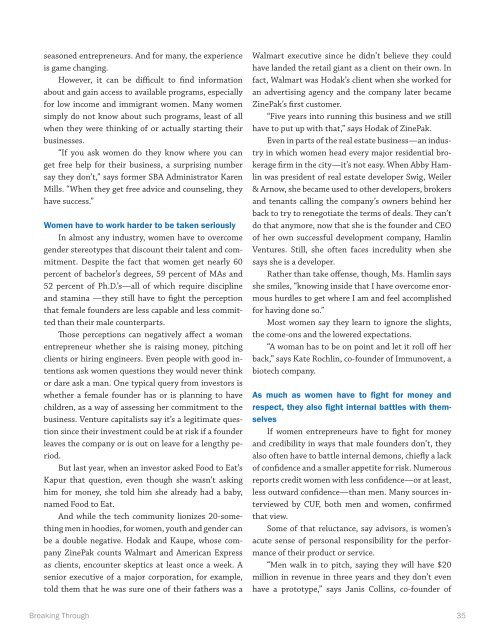BREAKING THROUGH
YWkgl
YWkgl
You also want an ePaper? Increase the reach of your titles
YUMPU automatically turns print PDFs into web optimized ePapers that Google loves.
seasoned entrepreneurs. And for many, the experience<br />
is game changing.<br />
However, it can be difficult to find information<br />
about and gain access to available programs, especially<br />
for low income and immigrant women. Many women<br />
simply do not know about such programs, least of all<br />
when they were thinking of or actually starting their<br />
businesses.<br />
“If you ask women do they know where you can<br />
get free help for their business, a surprising number<br />
say they don’t,” says former SBA Administrator Karen<br />
Mills. “When they get free advice and counseling, they<br />
have success.”<br />
Women have to work harder to be taken seriously<br />
In almost any industry, women have to overcome<br />
gender stereotypes that discount their talent and commitment.<br />
Despite the fact that women get nearly 60<br />
percent of bachelor’s degrees, 59 percent of MAs and<br />
52 percent of Ph.D.’s—all of which require discipline<br />
and stamina —they still have to fight the perception<br />
that female founders are less capable and less committed<br />
than their male counterparts.<br />
Those perceptions can negatively affect a woman<br />
entrepreneur whether she is raising money, pitching<br />
clients or hiring engineers. Even people with good intentions<br />
ask women questions they would never think<br />
or dare ask a man. One typical query from investors is<br />
whether a female founder has or is planning to have<br />
children, as a way of assessing her commitment to the<br />
business. Venture capitalists say it’s a legitimate question<br />
since their investment could be at risk if a founder<br />
leaves the company or is out on leave for a lengthy period.<br />
But last year, when an investor asked Food to Eat’s<br />
Kapur that question, even though she wasn’t asking<br />
him for money, she told him she already had a baby,<br />
named Food to Eat.<br />
And while the tech community lionizes 20-something<br />
men in hoodies, for women, youth and gender can<br />
be a double negative. Hodak and Kaupe, whose company<br />
ZinePak counts Walmart and American Express<br />
as clients, encounter skeptics at least once a week. A<br />
senior executive of a major corporation, for example,<br />
told them that he was sure one of their fathers was a<br />
Walmart executive since he didn’t believe they could<br />
have landed the retail giant as a client on their own. In<br />
fact, Walmart was Hodak’s client when she worked for<br />
an advertising agency and the company later became<br />
ZinePak’s first customer.<br />
“Five years into running this business and we still<br />
have to put up with that,” says Hodak of ZinePak.<br />
Even in parts of the real estate business—an industry<br />
in which women head every major residential brokerage<br />
firm in the city—it’s not easy. When Abby Hamlin<br />
was president of real estate developer Swig, Weiler<br />
& Arnow, she became used to other developers, brokers<br />
and tenants calling the company’s owners behind her<br />
back to try to renegotiate the terms of deals. They can’t<br />
do that anymore, now that she is the founder and CEO<br />
of her own successful development company, Hamlin<br />
Ventures. Still, she often faces incredulity when she<br />
says she is a developer.<br />
Rather than take offense, though, Ms. Hamlin says<br />
she smiles, “knowing inside that I have overcome enormous<br />
hurdles to get where I am and feel accomplished<br />
for having done so.”<br />
Most women say they learn to ignore the slights,<br />
the come-ons and the lowered expectations.<br />
“A woman has to be on point and let it roll off her<br />
back,” says Kate Rochlin, co-founder of Immunovent, a<br />
biotech company.<br />
As much as women have to fight for money and<br />
respect, they also fight internal battles with themselves<br />
If women entrepreneurs have to fight for money<br />
and credibility in ways that male founders don’t, they<br />
also often have to battle internal demons, chiefly a lack<br />
of confidence and a smaller appetite for risk. Numerous<br />
reports credit women with less confidence—or at least,<br />
less outward confidence—than men. Many sources interviewed<br />
by CUF, both men and women, confirmed<br />
that view.<br />
Some of that reluctance, say advisors, is women’s<br />
acute sense of personal responsibility for the performance<br />
of their product or service.<br />
“Men walk in to pitch, saying they will have $20<br />
million in revenue in three years and they don’t even<br />
have a prototype,” says Janis Collins, co-founder of<br />
Breaking Through 35


